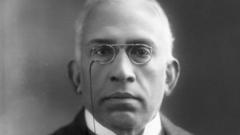

The Jallianwala Bagh massacre, a dark stain on the history of the British Empire, saw hundreds of unarmed Indians, gathered for a peaceful protest, gunned down by British troops on April 13, 1919. While the name of General Dyer, the man who ordered the firing, is etched in infamy, the story of Sir Chettur Sankaran Nair, an Indian lawyer and judge who dared to challenge the Empire's narrative, is less widely known but equally significant.
Born in 1857 in Kerala, Nair was a man of exceptional intellect and unwavering principles. He became one of the youngest presidents of the Indian National Congress and later served as a judge in the Madras High Court. A staunch advocate for social reform, his judgments often reflected his commitment to justice and equality, even when they clashed with the prevailing social norms.
However, it was his role in exposing the truth behind the Jallianwala Bagh massacre that truly cemented his place in history. Following the tragedy, the British government attempted to whitewash the incident, downplaying the number of casualties and justifying Dyer's actions. But Nair, then serving as a member of the Viceroy's Executive Council, refused to remain silent.
Driven by a sense of outrage and a deep commitment to justice, Nair launched his own investigation into the massacre. He meticulously gathered evidence, interviewed witnesses, and pieced together the horrifying truth. He then confronted the British authorities, demanding accountability for the atrocities committed.
His efforts were met with resistance and hostility. The British government, keen to protect its image, tried to silence him, but Nair was undeterred. He resigned from his position in the Viceroy's Council in protest and returned to England, determined to take his fight to the heart of the Empire.
In 1922, Nair published "Gandhi and Anarchy," a book that not only criticized Mahatma Gandhi's methods of non-violence but also laid bare the brutal reality of British rule in India. In it, he directly accused Michael O'Dwyer, the Lieutenant Governor of Punjab at the time of the massacre, of being responsible for the atrocities.
O'Dwyer, incensed by Nair's accusations, sued him for libel in London. The ensuing trial became a battleground for the truth, with Nair presenting compelling evidence of the massacre and the subsequent cover-up. Although Nair ultimately lost the case, the trial served to expose the horrors of Jallianwala Bagh to a wider audience and shattered the illusion of benevolent British rule. The trial, which lasted for five and a half weeks, brought the issue to the forefront of public consciousness.
Nair's courageous stand against the British Empire came at a personal cost. He faced ostracism from some quarters and endured financial hardship. Yet, he never regretted his decision to speak out. He believed that the truth was worth fighting for, no matter the consequences.
Sir Chettur Sankaran Nair's legacy extends far beyond his legal achievements. He was a man of unwavering integrity who dared to challenge the might of the British Empire in the pursuit of justice. His efforts to expose the truth about the Jallianwala Bagh massacre played a crucial role in shaping public opinion and galvanizing the Indian independence movement. He demonstrated immense courage in calling out the massacre and shaming the British Empire. His story serves as an inspiration to all those who believe in the power of truth and the importance of holding those in power accountable.